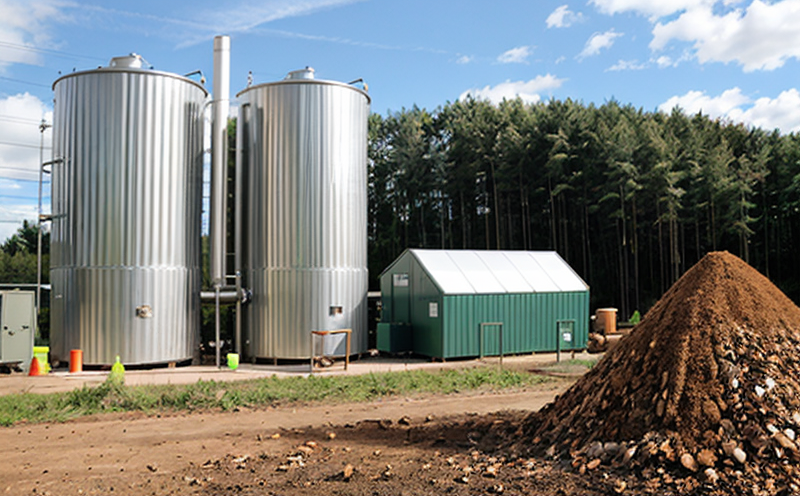ISO 18123 Volatile Matter in Waste-to-Energy Biomass Fuels
The ISO 18123 standard is crucial for assessing volatile matter content in biomass fuels used in waste-to-energy (WTE) processes. Volatile matter, a key component of the fuel's calorific value and combustion characteristics, directly impacts the efficiency and performance of WTE facilities. This test measures the mass loss of a sample at specific temperatures over time to determine its volatile matter content.
The process involves drying a representative sample of biomass under controlled conditions to remove moisture, then heating it in a muffle furnace or incinerator according to precise temperature and duration protocols specified by ISO 18123. The loss of mass during this procedure is indicative of the volatile constituents within the fuel.
The results from this test are essential for quality assurance and compliance with regulatory standards, ensuring that WTE fuels meet the necessary specifications for efficient combustion in energy recovery systems. Accurate determination of volatile matter content helps operators optimize combustion processes, enhance plant efficiency, and minimize emissions.
Understanding the volatile matter content is critical because it affects several factors including fuel’s ignition properties, flame stability, and overall thermal performance within a WTE facility. Higher volatile matter levels typically indicate better combustibility but also more rapid burning rates. Conversely, lower volatile matter might mean slower combustion times which could lead to incomplete combustion issues.
For quality managers and compliance officers, this test is vital for maintaining consistent fuel quality and ensuring adherence to environmental regulations. R&D engineers benefit from precise data on how different types of biomass affect the performance of WTE processes. Properly conducted tests like these contribute significantly to advancing sustainable waste management practices by optimizing resource utilization.
The ISO 18123 method is widely recognized for its reliability and accuracy across various industries dealing with biomass fuels. Its standardized approach ensures consistency in measurements regardless of where or by whom they are performed, facilitating effective communication between stakeholders involved in WTE projects.
Understanding the significance of volatile matter content through rigorous testing like ISO 18123 allows businesses to make informed decisions about selecting appropriate types of biomass for their operations. By incorporating such tests into regular quality control procedures, organizations can enhance operational efficiency while contributing positively towards environmental sustainability goals.
Customer Impact and Satisfaction
Our comprehensive ISO 18123 testing services significantly impact customers by providing accurate measurements of volatile matter in waste-to-energy biomass fuels. This ensures that clients receive reliable data which is essential for maintaining high standards of fuel quality.
Achieving compliance with relevant regulations becomes easier when we help our customers understand their obligations through detailed reports tailored to meet specific industry requirements. Our expertise enables organizations to stay ahead of changing legislation related to waste management and energy production.
For quality managers, having precise information about volatile matter content helps in making informed decisions regarding procurement strategies. By leveraging this knowledge, they can source better-quality raw materials that lead to improved product performance and reduced costs associated with poor material choices.
Compliance officers find our services invaluable as we assist them in verifying whether their processes comply with local and international standards related to biomass fuel specifications. This not only enhances reputation but also reduces risks of potential non-compliance fines or penalties.
R&D engineers benefit greatly from our detailed reports which provide insights into various aspects affecting the performance of waste-to-energy systems. These include combustion behavior, ash composition, and overall efficiency improvements that can be achieved by optimizing fuel blends based on test results.
Our commitment to excellence in service has resulted in high levels of customer satisfaction across different sectors including municipal authorities responsible for managing municipal solid waste, private companies involved in energy production from biomass sources, academic institutions conducting research into sustainable technologies, and government bodies tasked with enforcing environmental protection laws.
International Acceptance and Recognition
The ISO 18123 standard has gained widespread acceptance worldwide due to its rigorous methodology and consistent results across diverse environments. This international recognition underscores the importance of this test in ensuring uniform quality standards for waste-to-energy biomass fuels.
A significant number of countries have adopted ISO 18123 as part of their national regulations governing biomass fuel specifications, making it a de facto global benchmark. Many international organizations like the International Organization for Standardization (ISO) and regional bodies such as the European Committee for Standardization (CEN) contribute to its development and endorsement.
By adhering to this standard, businesses can ensure their products meet stringent quality requirements set by various authorities globally. This fosters trust among trading partners and enhances market access opportunities since compliant entities are more likely to be accepted in international markets.
The widespread acceptance of ISO 18123 also promotes collaboration between countries sharing common environmental goals. For instance, many nations involved in the circular economy movement have embraced this standard as a key element in their strategies for efficient resource utilization and waste minimization.
Recognition from reputable organizations strengthens confidence in our testing capabilities and reinforces credibility among clients seeking reliable data on volatile matter content in biomass fuels. It demonstrates that we follow best practices outlined by leading authorities within the field, thereby encouraging further investment into sustainable technologies supported by robust scientific evidence.
Environmental and Sustainability Contributions
The ISO 18123 standard plays a pivotal role in advancing environmental sustainability efforts through its contribution to efficient waste management practices. By accurately measuring volatile matter content in biomass fuels, this test supports the development of more sustainable energy solutions.
One of the primary benefits is reduced greenhouse gas emissions associated with waste disposal. When properly managed via WTE facilities, non-recyclable materials can generate electricity or heat rather than decompose in landfills where they release methane—a potent温室游戏副本





